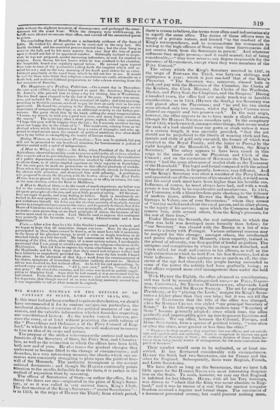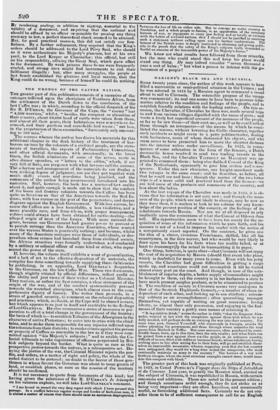SIR HARRIS NICOLAS ON THE OFFICES OF SE- CRETARY OF
STATE, LORD PRIVY SEAL, ETC.
ihr this tract had not been confined to private distribution, we should have recommended it for its curious antiquarian particulars, the incidental sketches it contains of the political manners of our an- cestors, and the valuable information which it furnishes respecting our cunstitutional history. As the reader cannot, however, pro- cure the essay, or at least without procuring the sixth volume of the " Proceedings and Ordinances of the Privy Council of Eng- land," to which it formed the preface, we will endeavour to convey to him an idea of its scope and nature. The purpose of the author is to compare the ancient and modern functions of the Secretary of State, the Privy Seal, and Chamber- lain, as well as the estimation in which the offices have been held, both now and of yore. He also traces the gradual changes they underwent to become fitted to the change of' circumstances; and describes, in a very interesting manner, the checks which our an- cestors were constantly struggling to place upon the politisal free- will of the Monarch. The authority throughout is the ancient national documents ; and though Sir HARRIS continually points attention to the results deducible from the facts, it is rather hi the method of exposition than by reasoning. The offices of Secretaries of State—or rather the office, for in theory the three are one—originated in the place or King's Secre- tary, or as it was called in very ancient times, King's Clerk. The first mention of the King's Secret ary—" noster Secretaries"— is in 1253, in the reign of HENRY the Third; from which period,
there is reason to believe, the terms were often used indiscriminately to signify the same office. The duties of these officers were in theory of a private nature, and limited " to the conduct of the Kings correspondence, and to cuntinunicate his commands in wriung to the high offieers of State when those functionaries did not receive them from the Sovereign in person." And whatever influence they might possess,—and it could se.arcel% fail of being considerable,—" they were never in any degree responsible for the measures of Government, except when they were members of the Pi ivy Council."
The salary which the King's Secretary received in 1347, in the reign of EDWARD the Third, was forty-six shillings and eightpence a year; which is just one-half that of the King's Physician. " The Secretary was, moreover, classed both in rank and pay with the Receivers of the Chamber, tile Clerks of the Kitchen, the Clerk Marshal, the Clerks of the Wardrobe, Market, and Privy Seal, the Chaplains, and the Surgeon." During a hundred years, the office had not made much way in heraldic consideration ; as in 1454, (11Essav the Sixth,,) the Secretary was still 'ductal after the Physicians; and " he and his two clerks were allowed only two yeomen, whilst the King's Carvers were allowed an esquire and two yeomen each." In the next reign, however, the otlice appears to us to have made a slight advance, (though Sir HARRIS NICOLAS considers not). In the sumptuary law of 1482, which enacted, amongst other things, that no one under the rank of a lord should wear any gown or cloak unless it were of' a certain length, it was specially provided, " that the act should not be prejudicial to the liberty of wearing cloth and fur, (purple and cloth of gold only excepted, the former of which was reserved to the Royal Family, and the latter to Peers,) by the eight knights of the Houscheld, or by M. Oliver, the King's Secretary." The salary appears to have been raised in this reign to the same scale as the Physician and Clerk of the Council ; and on the coronation of RICHARD the Third, his Sec- retary " had the same allowance of scarlet cloth as the Treasurer of' the Household.' The legal and formal compared with the actual estimation of persons, is frequently, however, very different. And as the King's Secretary was often a member of the Privy Council and appointed one of the executors of his master's will, it would seem that his social rank must have been higher than his heraldic one. Influence, of course, he most always have had, and with a weak prince it was likely to be considerable and mischievous. In 1-151, the Comsnons, with a blunt freedom quite shocking to the delicacy of modern times, address IlEssitv the Sixth about "Maisha Gervays he Volore, one of your Secretaries;" whom they accuse of " having misbehaved about the royal person, and in other places, to the injury of his service; upon which the Commons wished to remove him, with several others, from the King's presence, for the rest of their lives."
Under HENRY the Seventh, the real estimation in which the office was held was developed more formally than before ; for "our Secretary" was classed with the Barons in a list of wibe nesses to a treaty with Portugal. Various collateral reasons may be assigned for this change; amongst others, the intellectual and politic character of the Monarch, whose capacity, trained it the schoul of adversity, was disregardful of feudal prejudices. The intrigues and conspiracies by which his reign was disturbed, and which called for craft and caution in his officers, as well as the high estimation in which he held Fox his first Secretary, had alho- their influence. But what perhaps was as much as all, the elm-. meter of the age had changed; the people having succeeded to some of the power the nobility had been gradually losing ; so that affairs required more civil management than under the bold 13aroils.
With IIEstav the Eighth, the office advanced in consideration; and was held by several distinguished meo,— as PACE, GAHM-. NER, CROMWELL, Sir THOMAS WRIOTHESLEV, afterwards Lord SOUTH AMPTON, and Sir HALER SADLER. The act for regulating Presidency, or for " placing the Lords," assigns the King's Secre- taries a higher place than they now take; but it was nut till the reign Of ELIZABETH that the title of' the office was changed, when Sir ROBERT Circiss was styled "our principal Secretary of Estate." In the following reign, the modern term " Secretary of State" became generally adopted ; since which time, the office gradually and imperceptibly grew up into its present fuutions and importance. We say ollice, because the Colonial, Foreign, and I tome Secretaries, form a species of political trinity, " noire afore or after the other, none greater or less than the other."
" Whatever be their manbar, they constitute but one officer, awl are c000li- nate and equal in rank and authority. Etch is competent to execute any pate of the duties of Secretary of State ; the oidinary division of those duties be- tween them beim; merely matter of arrangement, for the inure convenient des- patch of business."
Their number would seem to be unlimited, or at least un- settled. It has fluctuated considerably with circumstances. HENRY the Sixth had two Secretaries, one for France and the other for England. Subsequently, there were English, French, and Latin Secretaries.
We have dwelt so long on the Secretaries, that we have left little space for Sir HARRIS NICOLAS'S most interesting disquisvs lion on the Seals. To seals, however, we tnay say that England is indebted for her liberty. HUME, with all his Tory leanings, was driven to "admit that the King was never absolute its Eng- land;" and it was by means of a seal that the ancient irregular freedom received a regular and formal shape. The enrolment of a document prevented secrecy, but could prevent nothing more.
By rendering sealing, in addition to signing, essential to tbe validity of a document, and requiring that the national seal should be affixed by an officer te4ponsible for passing any thing contrary to law, a perfect theoretical check seemed to be attained. But, for good practical reasous, this did not satisfy our fore- fathers. By a further refinement, they required that the King's orders should be addressed to the Lord Privy Seal, who should as it were authenticate his Majesty's pleasure, but at his own peril, to the Lord Keeper or Chancellor; this official, but still on his responsibility, affixing the Great Seal, which gave effect to the document. By weak princes these forms were frequently eroded, and strong ones might find instruments to risk their fulfilment illegally : but, after many struggles, the people at last firmly established the glorious and loyal maxim, that the Xing could do no wrong, because of himself he could do nothing.



























 Previous page
Previous page